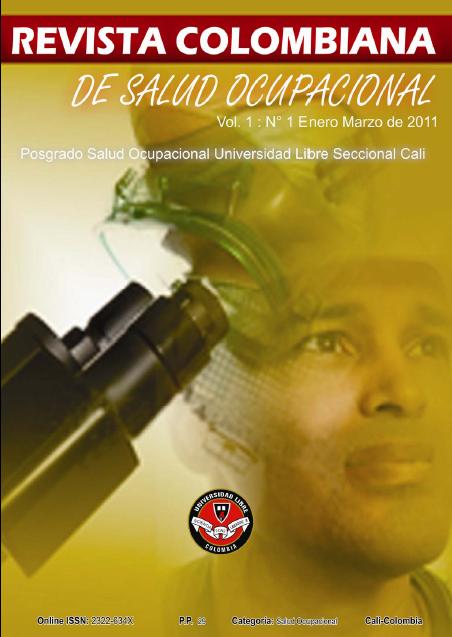Psychosocial factors and work stress of nursing hospital in Guadalajara, México
Keywords:
occupation, health, sanitary personnelAbstract
Stress at work is a problem of great magnitude and global significance, and affects the worker productivity. In the hospital setting, can be caused by psychosocial factors that have recently been defined.
Objective: for the above we decided to determine which psychosocial factors are associated with occupational stress in nursing staff in tertiary care.
Methodology: transversal study on probability sample of 218 nurses assigned to Pediatric Hospital. We applied the validated instrument called psychosocial factors at work and stress, inventory Seppo Aro, with Cronbach's alpha of 0.83 and 0.88 respectively and sociodemographic variables were considered contractual. With SPSS 10.0, we use descriptive statistics and X2, on the significant P <0,05.
Results: mean age 37 + / -8 years, 55% married, 17% nursing auxiliaries, 54% nurse (or) general, 18% specialists, 11% floor managers, 35% day shift, 30% and 35% evening night. Stress found in 24% of the sample, not associated with socio-demographic characteristics except contractual shift. Psychosocial factors in 5 of 7 dimensions associated with stress. Remuneration and social interaction have no significant association. Workplace conditions and requirements are rated more negatively by people under stress and identified in 57% and 80% as poor, respectively.
Conclusions: Psychosocial factors at work are classified as unfavorable by 37%. The frequency of stress is lower than reported, however, must
address the problem of stress and their relation to psychosocial factors at
work.
Downloads
References
Organización Internacional del Trabajo (OIT). Introducción al estudio del trabajo. México: Limusa, 1995.
Juárez-García A. Factores psicosociales laborales relacionados con la tensión arterial y síntomas cardiovasculares en personal de enfermería en México. Salud Pub Méx. 2007;49(2):109-117.
Lazarus, R. Estrés y emoción. Manejo e implicaciones en nuestra salud. Editorial Desclée De Brouwer. Biblioteca de Psicología. Bilbao, España, 2000.
Chen YM et al. Role stress and job satisfaction for nurse specialists. J.Adv.Nurs. 2007;59:497-509.
Aziah BD et al. Prevalence and associated factors of job-related depression in laboratory technicians in Hospital Universiti Sains Malaysia (HUSM) and Ministry of Health Malaysia (MOH) Hospitals in Kelantan. Med.J.Malaysia 2004;59:268-78.
Quirós-Aragón M, Labrador-Encinas F. Evaluación del estrés laboral y burnout en los servicios de urgencias extra hospitalarias. Int J Clin Health Psicol. 2007;7(2): 323-335.
Rodríguez-González R, Roque-Doval Y, Molerio-Pérez O. Estrés laboral: consideraciones sobre sus características y formas de afrontamiento. 2002;3(1).
Cox T, Griffiths A, Rial-González E. Research on work - related stress. Luxemburgo: European Agency for Safety and Health at Work, 2002.
Hernández-Mendoza E, Cerezo-Reséndiz S, López-Sandoval MG. Estrategias de afrontamiento ante el estrés laboral en enfermeras. Rev Enferm Inst Mex Seguro Soc 2007; 15 (3): 161-166
Karasek R. El modelo de demandas/control: enfoque social, emocional y fisiológico del riesgo de estrés y desarrollo de comportamientos activos en: Centro Interamericano de Investigación y Documentación sobre Formación Profesional, Enciclopedia de Salud y Seguridad en el Trabajo, 2001 Volumen 2, numero 34 pp. 6-15.
Román-Hernández J. Estrés y Burnout en profesionales de la salud de los niveles primario y secundario de atención. Rev Cubana Sal Púb. 2003;29(2):103-110.
Aro S. Stress morbidity and health relested behaveur. Scand J Soc Med Suppl 1981;25:81-6.
Silva-Gutiérrez N. Elaboración de instrumento de factores psicosociales. Tesis de doctorado no publicada. Universidad de Guadalajara. México 2006.
Pérez MA, Martín A, Gallego A, Correa E, Pérez J. Repercusiones psicológicas del estrés laboral en los profesionales sanitarios que trabajan en los Equipos de Trasplantes. Medicina psicosomática y psiquiatría de enlace, 2003 pp. 66.
Mastrangelo G, Mattioli S, Baldasseroni A, Bontadi D, Capodicasa E, Marzia V, Mazzi M, Patané P, et. al. Occupational injuries and sickness absence: association with job demand, decision latitude, and life style in 2174 workers in the Veneto Region. Med Lav. 2008;99 Suppl 1:31-41.
Harling, M., Strehmel P., Schablon, A., Nienhaus, A. Psychosocial stress, demoralization and the consumption of tobacco, alcohol and medical drugs by veterinarians. Journal of Occupational Medicine and Toxicology 2009;4:4


